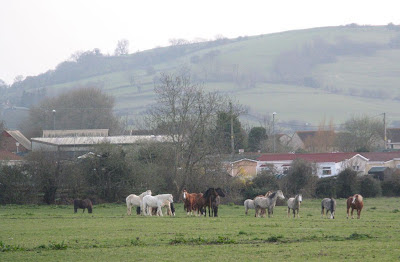This
little lot, hauled out from no more than 50m2 of the
woodland edge behind it, was just one small part of the litter and
flytipping recovered from the parts of Stockwood targetted in a
litter-pick on April 1st.
Extracting
it from the woods and open spaces certainly reinforces anyone's
misanthropic leanings, but more positively it encourages reflection
on the throwaway society, waste collection strategies, and how the
hell we're going to manage when our planet acquires a new plasticised
aluminised skin of snack food wrappers. (Maybe its reflective
quality will compensate for the diminishing polar ice cover and we
needn't worry about climate change after all? Or maybe not.)
So
why do people throw it away? Not the casual thoughtless littering,
but the more serious, calculated stuff, which can involve shifting
heavy items a long way off-road.
Like this stuff, dumped a good
100m along the path by Brislington Brook and slowly spread during the
following week. Smaller than most fly-tips, but fairly typical of a
partial house clearance, this was brought over from Withywood and
just dropped, without any attempt at concealment. Possibly by the
occupier named on the bills among the waste, more likely by the
landlord, or maybe by white van man. I just hope the enforcement
people make a better job of finding out than May Gurney made of
clearing it.
One
reason for the tipping must be that there's little risk of getting
caught, and it would be good to see much more effective enforcement.
Another's the sheer volume of stuff we're urged to throw away to
make room for something else in an unsustainable economy that relies
on ever increasing consumption. And another's the cost of disposing
of it (especially commercial waste).
Ideally,
disposal costs would be free at point of use, and met by a levy built
into the price of goods to reflect their true costs. Can't see that
happening though. Equally unlikely (and unfair too) would be a free
'bulk load' disposal service provided by the council at public
expense. Maybe a compromise would be a mobile 'bring' site –
meaning skips - on a regular rota, where residents could bring their
excess property, then left awhile for those of us who might find a
use for it, and the residue removed later.
No
doubt Mr Pickles (whom Damien Hirst preserve) and the Daily Mail
would put the whole problem down to the evil of fortnightly doorstep
collection of residual waste, which, they claim, infringes the basic rights
of every Englishman. Wasn't it good to see that Pickles' bribe to
councils to revert to weekly residual waste collections was taken up
by just one council (Gloucester city) ; all the other bidders have
had the good sense to seek funding instead for such as segregated
food waste collection.
Food
waste recycling - that's an initiative which, I would argue, did more
to demonstrate Bristol's status as a progressive modern city than any
new stadium or arena could possibly have done.








